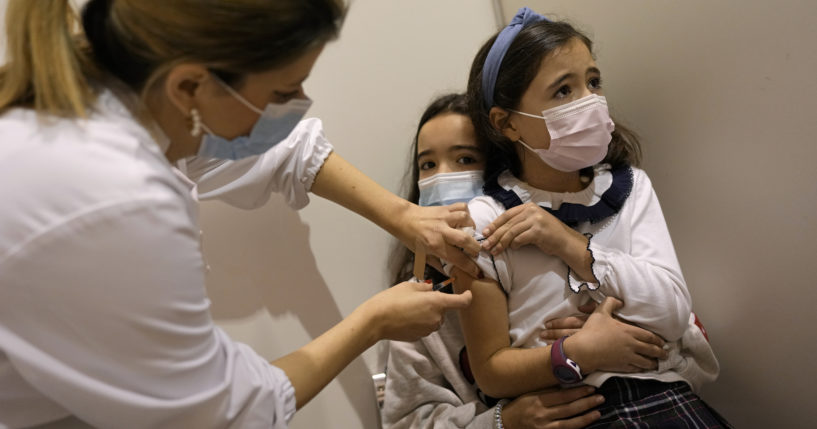
Two Countries with Sky-High Vaccination Rates Re-Institute Lockdown Measures as COVID Cases Spike
Despite vaccination rates that make other governments envious, Spain and Portugal are facing the hard truth that, with the new omicron variant running rampant, these winter holidays won’t be a time of unrestrained joy.
Portugal on Tuesday announced a slew of new restrictions over Christmas and the New Year, making working from home mandatory and shutting discotheques and bars beginning Saturday night.
Also, a negative test result must be shown to enter Portuguese cinemas, theaters, sports events, weddings and baptisms until at least Jan. 9.
Portugal will impose exceptional measures on Christmas Eve and Christmas Day, as well as on New Year’s Eve and New Year’s Day, including having a negative test result to enter restaurants and public celebrations.
And on New Year’s Eve, no more than 10 people can gather in the street, and drinking alcohol outdoors will be prohibited.
That is happening despite almost 87 percent of Portugal’s population being fully vaccinated. The latest problem is due to the omicron variant, which is racing across Europe.
Spain, too, had hoped for a relaxed, festive Christmas, since 80 percent of its population of 47 million were vaccinated — including 90 percent of those over 12 — and face masks are widely used.
But the incredibly fast spread of the omicron variant is starting to put pressure on Spanish hospitals, even though experts agree that being vaccinated still greatly reduces the risk of falling seriously ill.
Catalonia, home to the city of Barcelona, is prepared to become the first Spanish region to reinstate serious limitations and put a damper on the holiday cheer. One-fourth of everyone hospitalized in Spain with COVID-19 is in Catalonia.
“We had all hoped to spend these Christmas holidays with our family and loved ones, but unfortunately we are not in that situation,” Catalan regional president Pere Aragonès said Tuesday. “You don’t have to look at the numbers. All of us know people who have been infected.”
Catalan health authorities have asked the courts to authorize a battery of measures, including a new nightly curfew from 1-6 a.m., a limit of 10 people per social gathering, the closure of nightclubs, capping restaurants at 50 percent of indoor seating, and capping stores, gyms and theaters at 70 percent capacity.
If approved, the rules would take effect on Christmas Eve and last for 15 days, wiping out most New Year’s parties.
“These steps are absolutely necessary,” said Catalonia’s regional health chief, Josep Argimon. “Infections have grown 100 percent over the past week.”
Spain is back in the high-risk zone with over 600 cases per 100,000 inhabitants over 14 days, more than double the accumulated cases seen before last year’s winter holidays. The omicron strain has shot up from 5 percent of new cases in Spain to 47 percent within one week.
The decision by Catalonia comes a day before Spain’s prime minister, Pedro Sánchez, meets via video with the heads of Spain’s 17 regions to discuss new COVID-19 restrictions. Medical groups and experts are clamoring for more action to be taken.
“The rise in the diagnosis of new cases in health clinics and hospitals … can in the short- to mid-term lead to a new collapse of the health system,” Spain’s association of lung doctors said last week.
But it seems that most Spanish regions are reluctant to go as far as Catalonia, which has nearly 30 percent of its intensive-care beds occupied by COVID-19 patients.
That has left many families to take their health into their own hands. So many Spaniards are relying on self-screening that there is a shortage of self-administered antigen COVID-19 tests.
The Madrid Pharmaceutics Official College told The Associated Press that demand in November for home test kits had gone up 500 percent in a month. Shipments were still arriving in pharmacies but were selling quickly.
Among those looking for some COVID-19 test kits was Eulalia Rodríguez. Her family was planning to welcome a relative traveling from abroad for Christmas, and she was struggling to find the tests after inquiring at four different pharmacies in Madrid.
“It’s really disappointing,” Rodríguez said. “At least they give you some peace of mind.”
The Western Journal has reviewed this Associated Press story and may have altered it prior to publication to ensure that it meets our editorial standards.
Truth and Accuracy
We are committed to truth and accuracy in all of our journalism. Read our editorial standards.
Advertise with The Western Journal and reach millions of highly engaged readers, while supporting our work. Advertise Today.












